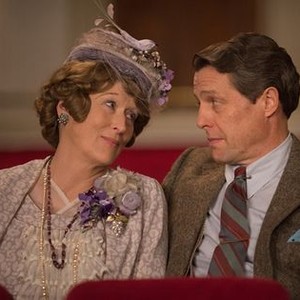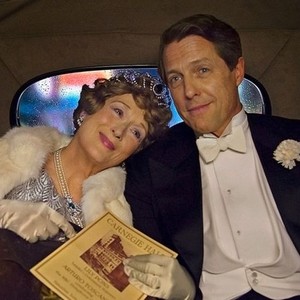 When Pathé Pictures International, the studio behind Stephen Frears’ Florence Foster Jenkins, chose to promote the film by publishing a list of the title character’s admirers — ranging from the likes of Sir Thomas Beecham and Enrico Caruso to Barbra Streisand and the late David Bowie — they clearly recognized that her story was of persistent interest in the musical zeitgeist since her death. If the premise sounds familiar, it should. Another movie loosely based on Jenkins, Xavier Giannoli’s Marguerite, premiered at Grail Moviehouse a scant two months ago. While I enjoyed Giannoli’s approach more than Frears’ take on the subject, Florence is clearly a much slicker production with vastly broader potential popular appeal.
When Pathé Pictures International, the studio behind Stephen Frears’ Florence Foster Jenkins, chose to promote the film by publishing a list of the title character’s admirers — ranging from the likes of Sir Thomas Beecham and Enrico Caruso to Barbra Streisand and the late David Bowie — they clearly recognized that her story was of persistent interest in the musical zeitgeist since her death. If the premise sounds familiar, it should. Another movie loosely based on Jenkins, Xavier Giannoli’s Marguerite, premiered at Grail Moviehouse a scant two months ago. While I enjoyed Giannoli’s approach more than Frears’ take on the subject, Florence is clearly a much slicker production with vastly broader potential popular appeal.
Jenkins’ life story has seen a resurgence of popular interest in recent years. Although it would take a sociologist to explicate the timing, the appeal is somewhat more self-explanatory. Jenkins represented the epitome of wealth and entitlement, leveraging her social status in a bid to become a renowned grande dame of the New York opera scene without regard for her complete lack of skill or sonority — and there’s a cringe-inducing entertainment value in her misguided quest. I’m tangentially reminded of Dorothy Comingore’s Marion Davies proxy in Citizen Kane, a similarly talentless operatic hack thrust into the spotlight by sheer force of finance. Unlike Comingore’s Susan Alexander Kane, however, Jenkins was blissfully unaware of the fact that she sucked until the final weeks of her life (depicted in the film’s climactic sequence of the singer’s disastrous 1944 public performance before a sold-out crowd at Carnegie Hall). So, is the moral of this story that a dream deferred dries up unless you’re affluent enough to buy success? It’s difficult to say whether audiences are posthumously laughing with or at Jenkins, but the fact of the matter is her story is pretty funny if you don’t think about its implications too closely. 
While I may not find myself among this film’s intended target demographic, even I found it to be a largely entertaining diversion. Though it may not be my favorite of Frears’ films, it’s in the top 10 (if not the top five), and is an undeniably impressive period piece considering its relatively modest budget. That said, the film is not without its flaws, with most of these deficiencies derived from Nicholas Martin’s script. The narrative is almost entirely devoid of character development, and its principal characters remain largely unchanged by the story’s end. The closest thing this film has to a villain might be reality itself — never the easiest story to write. But tremendous performances from Meryl Streep and Hugh Grant redeem the film, and that’s an immeasurable boon to audiences everywhere. Without them this movie would’ve almost certainly descended into a meaningless exercise in mawkish sentimentality.
Streep unsurprisingly shines as Jenkins, reveling in every simian squawk and tone-deaf aria with a sense of endearing naiveté that never quite succumbs to saccharinity. While she’s is obviously the draw here, Grant’s performance as Jenkins’ husband-gigolo-manager-reality filter is the best work I’ve seen from him in quite some time. I was initially wary of sitcom star Simon Helberg’s casting as Jenkins’ young piano accompanist, and he does come out of the gate with a healthy serving of ham. But he finds his footing by the second act and delivers a performance ingratiating enough to lead me to suspect he might be capable of more than the broad geek-farce of the Big Bang ilk. Few of the supporting players register for more than a scene or two, but the central cast is strong enough to sell even the weakest script.
Ultimately, Florence Foster Jenkins comes together as more than the sum of its parts precisely because those constituent parts are so accomplished, which may be its sole advantage over Marguerite. While Jenkins’ audiences were deceptively kind throughout the majority of her life, whatever unduly positive bias in the critical consensus might exist on the basis of Streep’s involvement is strictly marginal. This film may not be quite as good as many critics seem to think, but it’s certainly a more worthwhile expenditure of time than Jenkins’ artistic output. Rated PG-13 for brief suggestive material.
Opens Friday, Aug. 12, at Fine Arts Theatre






Before you comment
The comments section is here to provide a platform for civil dialogue on the issues we face together as a local community. Xpress is committed to offering this platform for all voices, but when the tone of the discussion gets nasty or strays off topic, we believe many people choose not to participate. Xpress editors are determined to moderate comments to ensure a constructive interchange is maintained. All comments judged not to be in keeping with the spirit of civil discourse will be removed and repeat violators will be banned. See here for our terms of service. Thank you for being part of this effort to promote respectful discussion.